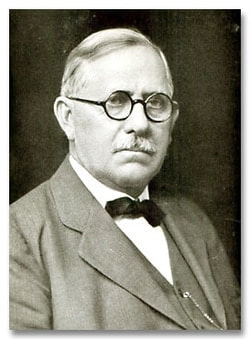
garments that are not in use. It is the furs and flannels and woolen garments that are put away in summer storage awaiting the return of the winter that suffer the most from the ravages of the moth. The garments that we wear every day don't seem to attract him.
This also true in regard to sin. Sin seems to make but little or no inroads into that soul that is busy working for Jesus with the love of God shed abroad in his heart and life hid with Christ in God. But just think of that idle soul that is always a part to sin. It will "remain forever true that Satan finds some mischief still for idle hands to do." It has often been said that "an idle brain is the devil's workshop."
I have noticed that a young man or woman with nothing to do but lie around town or loaf on the street corners, wasting time, soon becomes vicious and sinful, unmanly and unwomanly. The most of the dark, black, murky, muddy, mysterious, unbelievable, unthinkable, and unknowable schemes that have been pulled off in the last quarter of a century --ninety-nine out of a hundred of them -- have been planned by a crop of idlers and street loafers; so it still remains true that our idle days are Satan's busy days. Idleness is simply an inlet to temptation, but the Christian who is busy in the Master's service, trying to rescue the perishing and lifting up the fallen, cheering the sad-hearted, strengthening the weak, and comforting the lonely, won't be troubled much with sin's alluring bait.
Next, the moth is no respecter of persons; it spares neither the rich nor the poor, the high nor the low,the learned nor the ignorant, the black nor the white, red, brown, nor yellow, the philosopher nor the fool. It exempts no one from its work of destruction. The rich with their expensive furs and costly woolen wear and the poor with their cheaper and coarser wear are alike subject to its attacks.
This is also true of sin. It is everywhere doing its hellish work of destruction among the children of men. Go into our jails or penitentiaries and you will see there the classes that have been touched by sin. There you will see men of wealth, businessmen, senators, congressmen, lawyers, doctors, preachers, and great statesmen, men of talent, culture, and refinement; but through sin their lives have been blackened and there they are dragging out an existence with soiled and dishonored names, behind prison bars. These men with such wonderful opportunities before them probably had imagined that the little sins they first committed could never destroy them. Oh, they had seen others who had been wrecked, but they said that with their brilliant minds, wealth, and social standing sin could never put them down.
But just as truly as the little moth has destroyed the best garments in the home, sin has destroyed the brightest minds of our nation. As the moth eats the fiber and destroys the garments, so sin has worked its deadly fangs into their very hearts and lives, and now they are dying by the inch and their names are a hiss and a byword where they used to be honored and respected by everyone.
We next notice some of the remedies for the cure of this little insect we callthe moth. It is needless to say that the remedies are many and of various kinds. Some ladies have used the red cedar chest; others have packed their clothes in newspapers, believing that the moth won't bother clothes that are packed, thinking that a moth can't live where printer's ink is found. Others have used tobacco, they say, with good effect. Still others have used the mothballs,
but the smell of the mothball was almost as bad as the moths themselves, and the smell of tobacco was worse. Others have used what they call tar paper, but the yellow spot was so hard to get off the blankets that at last they had to abandon even the tar paper; for after several years of hot water and good soap the yellow tar spots were still there.
We have heard of many other remedies. I suppose there have been scores and scores of remedies used to try to dislocate and drive out and destroy this troublesome little insect that we call the moth. But after all the remedies that man can conceive of and all the remedies that women have applied to destroy the moth, we still have this deadly little insect. Its deadly work is still going on in its destruction of the garments of the poor people of the earth.
Robinson, Reuben A. (Bud). The Collected Works of 'Uncle Bud' Robinson. Jawbone Digital. Kindle Edition.
 RSS Feed
RSS Feed